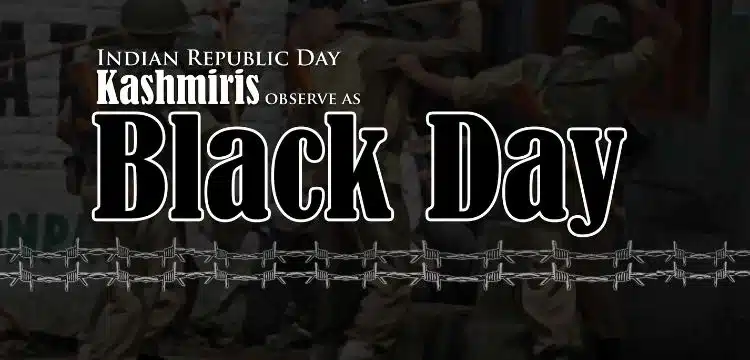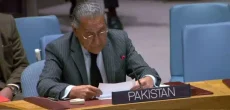[vc_row][vc_column][vc_column_text dp_text_size=”size-4″]
Kashmiris residing on both sides of the Line of Control are commemorating India’s Republic Day as a Black Day this Friday. The purpose of this observance is to express their vehement opposition to India’s persistent refusal to acknowledge their democratic entitlement to self-determination. The call for this day of reflection has been endorsed by the All Parties Hurriyat Conference and various other pro-freedom organizations.
In Indian Illegally Occupied Jammu Kashmir, the day will be characterized by a comprehensive strike, underscoring the collective sentiment against India’s policies. Simultaneously, anti-India demonstrations are slated to take place in Azad Kashmir as well as various international capitals, emphasizing the global resonance of the Kashmiri struggle for self-determination.
Read more: Pakistan Calls On UN To Enforce Kashmir Resolutions
Concurrently, India has escalated its repressive measures within the territory, implementing an unparalleled lockdown and deploying additional check-posts. These actions are purportedly justified under the umbrella of security concerns, but they have resulted in a considerable infringement on the daily lives of Kashmiri residents. The intensified scrutiny through rigorous inspections adds to the already challenging circumstances faced by the people in the region.
The decision to observe India’s Republic Day as a Black Day stems from the Kashmiri population’s enduring dissatisfaction with the denial of their democratic rights by the Indian government. The longstanding demand for self-determination is rooted in the desire for autonomy and the ability to shape their own political destiny. The call for this day of protest is not just a symbolic gesture; it is a poignant expression of the Kashmiri people’s resistance against what they perceive as a suppression of their fundamental rights.
The All Parties Hurriyat Conference, a key proponent of the observance, has been at the forefront of articulating the grievances and aspirations of the Kashmiri populace. Alongside other pro-freedom organizations, they are leveraging this occasion to draw attention to the urgent need for international intervention in addressing the longstanding Kashmir issue. By choosing to designate India’s Republic Day as a Black Day, Kashmiris aim to underscore the gravity of their situation and to garner support on a global scale.
The situation in Indian Illegally Occupied Jammu Kashmir is exacerbated by India’s intensified crackdown. The imposition of an unprecedented lockdown and the proliferation of additional check-posts contribute to an environment of heightened tension and restricted movement. These measures, ostensibly implemented in the name of security, further curtail the already limited freedoms of the Kashmiri people.
The decision to hold anti-India demonstrations in Azad Kashmir and world capitals reflects the global resonance of the Kashmir issue. Kashmiris are not confining their resistance to the local domain; instead, they are reaching out to the international community, seeking solidarity and support in their struggle for self-determination. The symbolic act of observing India’s Republic Day as a Black Day serves as a poignant reminder to the world of the unresolved nature of the Kashmir conflict and the urgent need for diplomatic intervention.
As India continues its crackdown, the Kashmiri people remain resilient in their pursuit of justice and fundamental rights. The observance of India’s Republic Day as a Black Day is a testament to their unwavering commitment to achieving self-determination and the right to shape their own political destiny. The global community’s response to this poignant expression of dissent will undoubtedly play a crucial role in shaping the trajectory of the Kashmiri struggle in the days to come.
[/vc_column_text][/vc_column][/vc_row]











